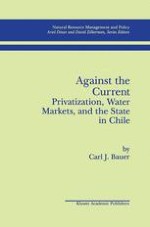1998 | OriginalPaper | Buchkapitel
Private Property and River Basins: Water Use Conflicts, the Market Model, and the Courts
verfasst von : Carl J. Bauer
Erschienen in: Against the Current: Privatization, Water Markets, and the State in Chile
Verlag: Springer US
Enthalten in: Professional Book Archive
Aktivieren Sie unsere intelligente Suche, um passende Fachinhalte oder Patente zu finden.
Wählen Sie Textabschnitte aus um mit Künstlicher Intelligenz passenden Patente zu finden. powered by
Markieren Sie Textabschnitte, um KI-gestützt weitere passende Inhalte zu finden. powered by
River basins present one of the most difficult and complicated problems in natural resource management: how to coordinate multiple water uses in the same drainage. To deal with this problem requires sorting through conflicting uses which involve different sectors of regional economies, where the stakes are often high. This chapter examines how such problems have been handled under Chile’s current Water Code, with its strong free market principles. The free market approach to river basin management relies on property rights to water that are private, exclusive, and transferable. Water uses are to be coordinated through private bargaining, in a process reminiscent of the Coase Theorem. As discussed in Chapter One, the Coase Theorem states that bargaining among private property owners allocates resources more efficiently than government regulation. I argue that the Chilean case highlights that the overall legal and institutional framework is crucial to how markets work. Many proponents of free market policies, particularly neoliberal economists, oversimplify what is involved in several key processes that market forces depend on but cannot carry out themselves: defining property rights, resolving conflicts, and dealing with externalities.
